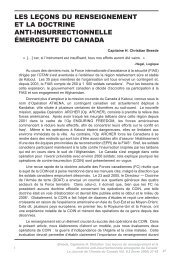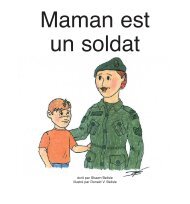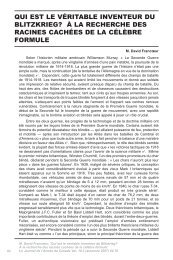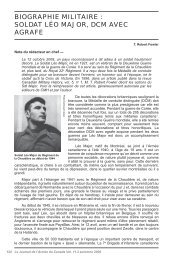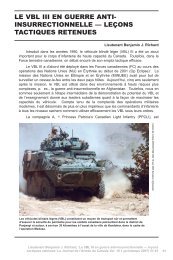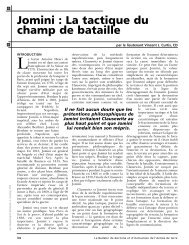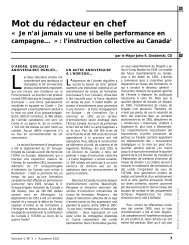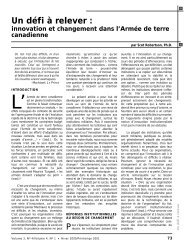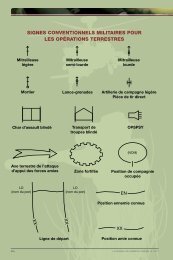The Canadian Army Journal
The Canadian Army Journal
The Canadian Army Journal
Create successful ePaper yourself
Turn your PDF publications into a flip-book with our unique Google optimized e-Paper software.
22<br />
Whether the American forces in Iraq have found the right operational balance for the<br />
Iraqi conflict is difficult to assess. What is clear, however, is that ambushes and IEDs<br />
continue to undermine the political will to fight. <strong>The</strong> strategic countermeasures<br />
pressuring Iran to discontinue its support for the insurgents, particularly the help<br />
provided in designing and constructing new types of IEDs, are a step in the right<br />
direction. However, once again the counterinsurgents are facing a situation in which<br />
time is running out to effectively implement a strategic solution to the challenges created<br />
by ambushes and IEDs on the political home front.<br />
Conclusion<br />
Again, there should be absolutely no doubt that armed forces must prioritize force<br />
protection in counter-insurgency and work tirelessly at finding countermeasures to<br />
ambushes and IEDs. However, given that ambushes and IEDs are the bread and butter<br />
of insurgents, it is very unlikely that they will stop seeking new tactics to use against the<br />
foreign counterinsurgents. History shows how insurgents have been creative and<br />
imaginative in developing new ways of attacking their enemies. As in the past, it is a<br />
dangerous illusion to think that a “silver bullet” can be found against ambushes and<br />
IEDs.<br />
Ambushes and IEDs have been and continue to be the hallmark of insurgency<br />
warfare. <strong>The</strong> present conflicts in Afghanistan and Iraq are no exceptions. Contrary to<br />
conventional forms of warfare, insurgency is not about defeating the enemy’s armed<br />
forces. Rather, the goal is to demoralize the opponents’ political leadership and<br />
undermine its public support. Ambushes and IEDs become preferred tactics when one<br />
has limited means and yet is pursuing goals that are essentially situated at the strategic<br />
level. In other words, they are the optimum solution for someone who wants to avoid<br />
fighting a militarily superior enemy, while actively engaging politically that same enemy<br />
who is relatively weak in political terms.<br />
In this context, CF counter-IED activities need to be integrated into a genuine<br />
strategic plan that is much more than simply improving the public communications<br />
strategy. <strong>The</strong> Forces should be pushing to develop a true national strategy aimed at<br />
strengthening our national staying power. Our politicians might not be receptive to such<br />
a proposal, but it is certainly the best military advice that the CF can give them right now.<br />
About the Author…<br />
Eric Ouellet has a B.A and M.A. in political science from Université Laval, Quebec City, and a<br />
Ph.D. in organizational sociology from York University, Toronto. He works presently as a Defence<br />
Scientist with Defence Research & Development Canada at the Centre for Operational Research<br />
and Analysis in Ottawa. He has published on military leadership and command, and he is now<br />
doing research on the organizational challenges of counter-insurgency. He was previously<br />
professor at the <strong>Canadian</strong> Forces College in Toronto, and with the Department of Defence Studies<br />
at the Royal Military College of Canada. He served as reservist with the Voltigeurs de Québec in<br />
the 1980s.<br />
Endnotes<br />
1. Callwell. Small Wars, p. 125.<br />
2. See Chivers, C.J. “Dutch Soldiers Stress Restraint in Afghanistan.” New York Times (6 April 2007), Internet version,<br />
consulted on 11 September 2007, at http://www.nytimes.com/2007/04/06/world/asia.<br />
3. For interesting analyses of these conflicts please refer to Clutterbuck, <strong>The</strong> Long, Long War; Coates, Suppressing<br />
Insurgency; Harrison, <strong>The</strong> Endless War; Hunt, Pacification; Kinnard, <strong>The</strong> War Managers; Nagl, Eating Soup with a Knife;<br />
Moyar, Triumph Forsaken; Thompson, No Exit from Vietnam.<br />
4. Beckett. Modern Insurgencies and Counter-Insurgencies, p. vii.<br />
5. From older historiographies like the one proposed by De la Gorce in La conquête de l’Algérie to recent and critical ones<br />
<strong>Canadian</strong> <strong>Army</strong> <strong>Journal</strong> Vol. 11.1 Spring 2008


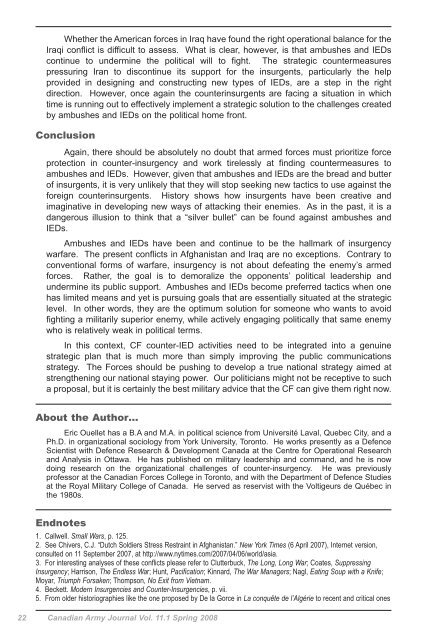
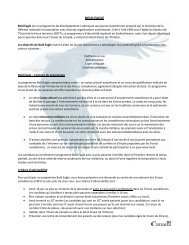
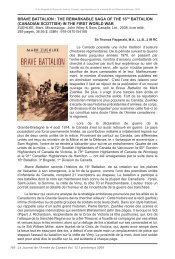
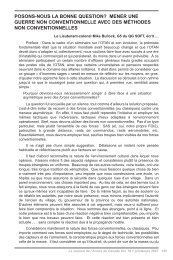
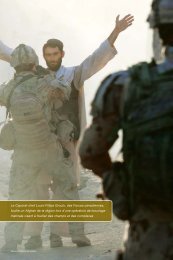
![La modularite dans l'Armee de terre canadienne [pdf 1.6 MB]](https://img.yumpu.com/17197737/1/188x260/la-modularite-dans-larmee-de-terre-canadienne-pdf-16-mb.jpg?quality=85)
